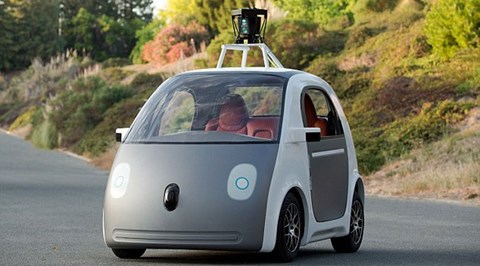► Ford commits to autonomous tech
► Self-driving cars in production by 2021
► Not a sideline, but a large-scale project
Ford has pledged to get its first fully autonomous car into production by 2021 – and it’ll be built at scale, not as a niche side project, according to the Blue Oval.
Tellingly, it’ll be aimed at an Uber-style car-share scheme, rather than private motorists. The announcement came as the company invested in new tech partners and doubled the size of its Silicon Valley R&D team in Palo Alto. It’s all part of Ford Smart Mobility, Dearborn’s plan to dramatically reshape the company’s strategy for this new, disrupted age of transportation.
Self-driving Fords: what to expect
Autonomous cars come in different stages. Your hands-off-the-wheel-briefly lane-keep assist of today is a moderate step in the journey to fully hands-off driverless cars.
The Ford vehicle will be fully autonomous level 4 stuff; that’s proper read-a-newspaper-and-have-a-snooze territory, while the car drives for you. SAE 4 means it won’t even need a steering wheel or pedals.
The company has committed to the project as part of a ride-hailing and sharing service. Proof that it’s thinking outside the main dealer business model.
The coming of autonomous cars
Ford already has 30 self-driving Fusion Hybrid cars (the US Mondeo, above) on the roads in Arizona, Michigan and California – and that number will treble by 2017, as more funds are pumped into the project.

Ford won’t have it all its own way; it’ll have to compete with start-ups and new mobility operators, such as Google. The search giant has aleady shown a prototype for its driverless pod (above), as it races to own the data generated by robo-cars.
Investment at Ford is focusing on the development of LIDAR and camera-based systems to be the eyes of future vehicles; the software and algorithms to interpret that data; and 3D mapping required for accurate driving by computers.
‘The next decade will be defined by automation of the automobile, and we see autonomous vehicles as having as significant an impact on society as Ford’s moving assembly line did 100 years ago,’ said Mark Fields, Ford president and CEO.
‘We’re dedicated to putting on the road an autonomous vehicle that can improve safety and solve social and environmental challenges for millions of people – not just those who can afford luxury vehicles.’
The next big things: Ford’s top execs on the future of the company